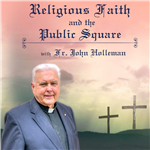Episodes
Conclusion of the Book of Revelation. Overview of The Relevance of Scripture to Religious Faith and the Public Square.
Published 05/10/18
Published 05/10/18
Conclusion of the Book of Revelation. Overview of The Relevance of Scripture to Religious Faith and the Public Square. Knowledge comes in a variety of forms which on the surface may seem to be incompatible, but which in reality are snapshots from different perspectives. They are all needed to fill out the whole picture. The current obsession with Science and Technology has led some to conclude that anything which does not conform to the standards and norms of science is outdated and...
Published 05/10/18
Continuing exploration of the symbolism used by John. This gives us a snapshot of what the earliest Church was having to contend with during the first 300 years of its existence.
Published 05/03/18
Continuing exploration of the symbolism used by John. This gives us a snapshot of what the earliest Church was having to contend with during the first 300 years of its existence. While ostensibly an analysis of seven church communities, it also functions as an epistle to all the Churches. The spiritual difficulties these churches are encountering are not confined just to them, for they also give us insight into the problems of today.
Published 05/03/18
The last book in the New Testament is bewildering and confusing for many. I will attempt to clarify its message and show how it can have relevance and meaning for us today.
Published 04/26/18
The last book in the New Testament is bewildering and confusing for many. I will attempt to clarify its message and show how it can have relevance and meaning for us today.
Published 04/26/18
With the passage of time without a Second Coming of Christ, it became necessary for the Church to develop mechanisms for preserving the Gospel as handed down by the Apostles.
Published 04/19/18
With the passage of time without a Second Coming of Christ, it became necessary for the Church to develop mechanisms for preserving the Gospel as handed down by the Apostles. It became necessary to deal with heresies and set standards for what writings should be considered authoritative. This led to the establishment of the Magisterium, which is not a committee of theologians but includes all the bishops throughout history. They are the successors of the Apostles. Much of this development can...
Published 04/19/18
We will finish up with covering St. Paul's take on the Christian faith, with particular attention to his views on justification by faith (in Romans).
Published 04/12/18
We will finish up with covering St. Paul's take on the Christian faith, with particular attention to his views on justification by faith (in Romans). Then we begin putting the preceding discussions including Paul in a more general perspective by considering the relationship between the Church and the (Roman) world and its implications for us today. Finally, we will be considering why and how the Church became an institution. This will not just be history per se, but an analysis of how we got...
Published 04/12/18
Published 04/05/18
Published 04/05/18
Matthew's Gospel makes the point that ethics is NOT a matter of mere conformity to a legal code, but a way of life that conforms to God's will as revealed by Jesus.
Published 03/29/18
Matthew's Gospel makes the point that ethics is NOT a matter of mere conformity to a legal code, but a way of life that conforms to God's will as revealed by Jesus. It is not confined to an individual's behavior: it involves the fulfillment of God's purposes in the Kingdom of God at the end of time. Thus, there is a corporate dimension as well. The whole community is responsible for the welfare of "the little ones. Works of kindness are not to be done for reward, bit solely on the basis of...
Published 03/29/18
Last week we finished with the Old Testament, so this week we begin with the New. It starts with historical developments and a description of the players such as Pharisees, etc.
Published 03/22/18
Last week we finished with the Old Testament, so this week we begin with the New. It starts with historical developments and a description of the players such as Pharisees, etc. to provide a framework for understanding the dynamics at work to help us better appreciate what the issues were. After that brief sketch, we turn to the first of the Gospels, that of Mark.
Published 03/22/18
Published 03/15/18
Published 03/15/18
The Babylonian armies attacked and captured Jerusalem twice: 597 and 587 B.C. But nationalism flourished nevertheless, and they attempted independence again 10 years later.
Published 03/08/18
The Babylonian armies attacked and captured Jerusalem twice: 597 and 587 B.C. But nationalism flourished nevertheless, and they attempted independence again 10 years later. This time the Babylonians reduced the city of Jerusalem to ruins and carted off yet more of the population, leaving a devastated Judah behind. It would be some 70 years before Cyrus the Persian would defeat the Babylonians and allow captive populations to return to their homelands. Needless to say, this was a very...
Published 03/08/18
Published 03/01/18
Published 03/01/18
Published 02/22/18
Published 02/22/18


